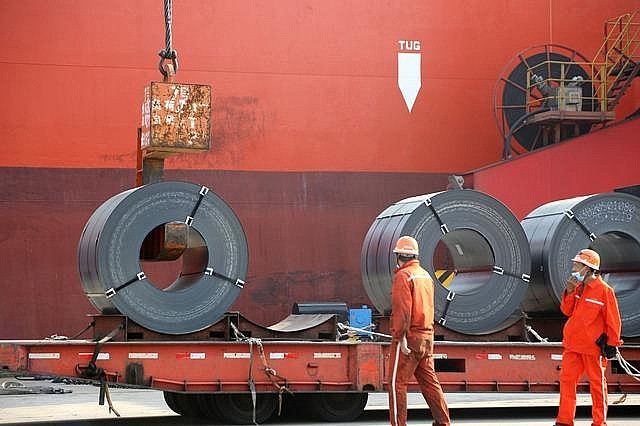
Thống kê
| 1882795 | |
| Số người đang online | 1 |
| Số truy cập hôm nay | 206 |
| Số truy cập tháng này | 57936 |
Quảng cáo
Vietnamese steel becomes target in global trade defense war

|
The global steel industry is facing a dense wave of trade defense as a series of countries investigate and impose anti-dumping taxes. Steel exported from Vietnam has become the focus of attention in many major markets.
The global trade war in the steel industry is becoming more complicated as countries step up defense measures, especially anti-dumping and anti-subsidy. Anti-dumping investigations and impositions are taking place continuously in many countries, including Vietnam and major export partners such as China, India, the EU and the US.
On November 12, the Vietnamese Ministry of Industry and Trade announced its decision to end the imposition of anti-dumping taxes on cold-rolled stainless steel imported from Taiwan, Indonesia, Malaysia and China. These measures have been applied since 2014 with a tax rate of 3.07%-37.29% and were extended in 2019. After the second review, the Ministry of Industry and Trade found that the damage to the domestic manufacturing industry had been significantly overcome, and the possibility of dumping behavior recurring was low. However, the Ministry will continue to monitor to protect the interests of the steel industry and domestic consumers.
In parallel with efforts to protect the domestic manufacturing industry, steel exported from Vietnam is facing a series of trade defense investigations from importing countries. From June to the end of October, there have been 7 anti-dumping investigations on Vietnamese steel, from Australia, the EU, Japan, India, and Thailand, including products such as hot-rolled coil (HRC), steel wire, corrosion-resistant steel (CORE), and hot-rolled reinforcing bars. In particular, major markets such as India and the EU simultaneously launched anti-dumping investigations into Vietnamese HRC steel in August.
Mr. Chu Thang Trung, Deputy Director of the Department of Trade Remedies (Ministry of Industry and Trade), shared: “Steel is a sensitive commodity and often becomes a target of trade defense in the world. When Vietnamese steel achieves export growth, it is also the time when countries step up anti-dumping investigations.”
Importing countries, including India, believe that cheap steel from China is diverted to Vietnam thanks to free trade agreements in the ASEAN region, causing competitive pressure on domestic producers. Business Standard reported that Indian steel producers have asked the Government to impose anti-dumping duties on Vietnamese HRC steel due to concerns that this cheap product will reduce domestic steel prices.
However, Mr. Trung affirmed that recent investigations into Vietnamese steel are not related to tax evasion by Chinese products. Some Vietnamese enterprises use Chinese hot-rolled steel to produce other products for export, but Vietnam is now more self-sufficient in hot-rolled steel production thanks to Hoa Phat and Formosa.
Notably, the Vietnamese steel industry not only faces trade defense measures from importing countries but also has to protect itself from the pressure of importing steel from abroad. On the same day, the Malaysian Ministry of Trade and Industry announced the initiation of an administrative review of cold-rolled stainless steel imported from Vietnam and Indonesia. This move stems from the fact that Bahru Stainless Sdn. Bhd., the only stainless steel producer in Malaysia, has stopped production since June 30. This poses a challenge for Vietnamese steel when it faces a wave of trade defense in the Southeast Asian market.
In the US, on October 30, the US International Trade Commission (ITC) issued its final conclusion on the anti-dumping investigation into extruded aluminum imported from 14 countries, including Vietnam. The ITC concluded that the US industry was not materially injured by these imports, leading to the US Department of Commerce (DOC) not imposing antidumping/countervailing duties on extruded aluminum from the investigated countries.
In this global trade war, the EU is also a notable market for Vietnamese steel as this bloc is the second largest steel export market of Vietnam, after ASEAN, accounting for 25% of steel exports. Any defensive move from the EU will have a major impact on the domestic steel industry.
Vietnamese steel becomes a target in the global trade defense war
With these consecutive investigations, Vietnam is facing great pressure as the steel industry is one of the key export industries but is also a commodity that is easily affected by trade defense policies. These measures help protect the steel industry of the importing country, but put Vietnamese exporting enterprises in a difficult situation. The Ministry of Industry and Trade pledges to continue supporting businesses in these trade defense cases, while promoting negotiations with partners to minimize adverse impacts on the Vietnamese steel industry in the coming time.
|
Liên kết website
Hỗ trợ trực tuyến
-
 Liên hệ ngay.Email:ĐT: (08) 6682 3335 - Fax: (08) 6256 2218
Liên hệ ngay.Email:ĐT: (08) 6682 3335 - Fax: (08) 6256 2218
Ngày giờ hiện tại
13/9/2025
clock




